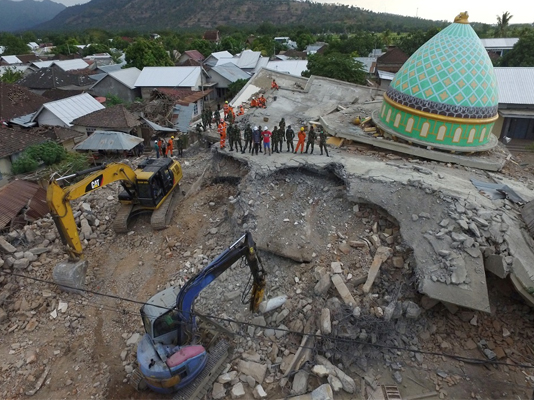JAKARTA, Aug 13, 2018 (BSS/AFP) – The death toll from an earthquake on the
Indonesian island of Lombok has topped 400, authorities said Monday, as
bodies were still being recovered from the ruins of destroyed buildings.
The shallow 6.9-magnitude quake on August 5 levelled tens of thousands of
homes, mosques and businesses across Lombok, just a week after another tremor
surged through the island and killed 17.
“Search and rescue teams are still removing victims who were buried beneath
collapsed buildings and landslides,” said national disaster agency spokesman
Sutopo Purwo Nugroho.
The total number killed in the quake is now 436, Nugroho said, with more
than 1,300 injured and nearly 353,000 displaced.
The hardest hit region of Lombok has been in the north, where 374 people
died and more than 137,000 have been forced from their homes, according to
the latest official tolls.
Most of the displaced are sleeping under tents or tarpaulins near their
ruined homes or in evacuation shelters, while makeshift medical facilities
have been set up to treat the injured.
Split open roads, particularly in the mountainous north of the island, are
still proving to be a major headache for relief agencies trying to distribute
aid.
Nugroho said three helicopters, including one from the military, have been
used to drop supplies to isolated communities, many of which urgently needed
clean water, food, bedding and medicine.
Meanwhile, the economic toll of the quake — including its impact to
buildings, infrastructure and productivity — has ballooned to 5 trillion
rupiah ($342 million).
“This damage and loss is very large,” said Nugroho, adding the final figure
was likely to be higher.
Survivors of the quake have been shaken by hundreds of aftershocks,
including a shallow 5.9-magnitude quake last Thursday which caused people to
flee evacuation shelters screaming and crying.
Authorities had previously said around 13,000 people sustained injuries and
387,000 were evacuated.
Nugroho said the drop in the number of displaced people was due to the fact
many were now spending time at their homes and gardens during the day and
returning to shelters at the night. Others had chosen to return to their
homes for good.



